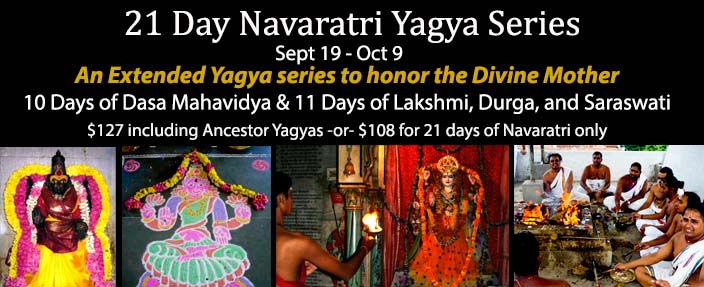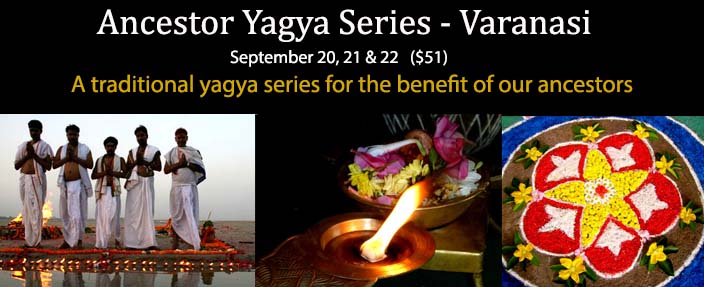

 |
||
Navaratri honors the Divine Mother in all of her various forms. The Shakti tradition celebrates 10 forms of the Divine Mother called the Dasa Maha Vidya (10 wisdom goddesses). The Vedic tradition celebrates Durga, Lakshmi, and Saraswati. Taken together, they represent Power, Abundance and Wisdom in their most auspicious and charming forms. We begin on September 19th with 10 days of yagyas, one day for each form of the Dasa Maha Vidyas. This is followed on Sept 29th with 10 days of yagyas starting with Ganesha, then Durga, Lakshmi, and Saraswati and ending on Vijaya Dashami - the day of victory, Oct 8th.
Each day, our priests perform an elaborate Chandi (shakti goddess) yagya from 7 AM to 1 PM, followed by 2 hours of evening pujas when the Chandi Path Goddess Mantra text is recited along with the 1008 names (Sahasranam) of Lalitha; the form of the goddess that combines both beauty and power. The final day, Vijaya Dashami, will feature special pujas for Saraswati who is honored on this day of victory, symbolic of the victory of light over darkness and joy over suffering. These yagyas are profoundly purifying and eliminate old stresses and bad karmas. As a result life is lived with greater freedom, happiness and satisfaction. These yagyas are combined with our (optional) annual three day Ancestor Yagya in Varnasi. Please click here for complete details on the Ancestor Yagyas. |
||
| Twenty-one Day Navaratri Yagya including Ancestor Yagyas ($127) | Credit Card |
PayPal |
Two Monthly Payments ($63.50) |
Two Monthly Payments ($63.50) |
|
| Twenty-one day Navaratri Yagyas only ($108) | Credit Card |
PayPal |
You will be able to enter family names when you purchase the yagya program. |
||
 |
Ancestor Yagya Series Please note, this program is a part of the complete Navaratri Yagya series |
This month, we are continuing the tradition of performing a special yagya for the benefit of the previous generations of our families. This ritual is ancient, dating back many thousands of years in the vedic tradition. The idea is a simple one. The vedic tradition includes reincarnation as the experience of multiple lives during which the soul evolves to greater purity and perfection. Families are an important part of this evolution because each generation provides for and protects subsequent generations. The Shraddha ritual is one in which we honor and symbolically feed and provide for the sustenance of previous generations of our family. In the Mahabharata there was a great warrior by the name of Karna whose mother was a young princess and father was Surya, the Sun. Soon after his birth he was given away for others to raise. As he grew up, he was renowned for his ethical nature and he always lived up to the requirements of natural law (dharma). After he died his soul ascended to heaven where he was warmly welcomed. But he was only offered gold and jewels to eat. Inquiring why, he was told that during his life he gave gifts of gold and jewels, but never made any offerings for the well being of his ancestors. He complained that he was unaware of who his ancestors were, so how could he have made any offerings? After some consideration, he was allowed to return to earth to conduct the necessary rituals. The time during which he did so is now known as Pitr Paksha, a time during which all ancestors are honored especially with offerings of food.
The ritual is complex and very different from typical vedic rituals and utilizes simple ingredients of fruit, grains, black sesame seeds, and balls of rice and barley flour called pinda. The priest recites mantras while elaborately constructing offerings that involve specific ingredients and movements as seen below.
When we perform the Shraddh ritual during Pitr Paksha, we always have 10 priests (above) for added power, but the process is much the same. Traditionally the very best place for this ritual to be performed is Varanasi and we are fortunate to be able to do so this year as in previous years.
This year as in previous years, we precede the Shraddh ritual with a daylong yagya for Shiva (above) and Shakti (below).
|